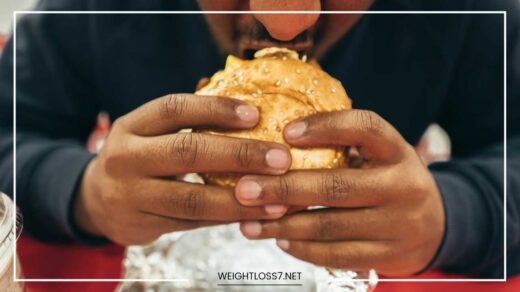Why Am I Not Losing Weight

Lose Weight
Why the Scale Isn’t Budging: Unveiling the Reasons Behind Stalled Weight Loss
You’ve been following all the “rules”: meticulously counting calories, religiously hitting the gym, and yet, the number on the scale remains stubbornly stuck. It’s enough to make anyone feel defeated and question their entire approach.
But before you resign yourself to diet despair, take a deep breath. Stalled weight loss is a common experience, and there are many reasons why it might be happening.
This comprehensive guide delves into the top culprits behind a weight loss plateau, helping you identify the culprit and get your journey back on track.
We’ll explore not just the dietary and exercise aspects, but also the often-overlooked lifestyle factors and even potential underlying medical conditions that can affect your weight management efforts. Buckle up, because we’re about to shed light on the mystery of the unmoving scale!
Calorie Conundrums: Eating Too Much or Too Little
Calories are the foundation of weight loss. To lose weight, you need to create a calorie deficit, meaning you burn more calories than you consume. But it’s a balancing act. Restricting calories too severely can backfire in several ways:
- Underestimating Intake: Our brains are remarkably good at justifying and rationalizing our eating habits. We often underestimate portion sizes, forget about mindless snacking, or underestimate the calorie content of seemingly healthy meals. Tracking your intake for a few days using a reliable app or a simple food journal can be an eye-opener.
- Not Eating Enough: Eating too few calories sends your body into starvation mode. It slows down your metabolism, the rate at which your body burns calories for energy. This means you’ll burn fewer calories overall, making weight loss even more challenging. Aim for a moderate calorie deficit, ideally calculated with the help of a registered dietitian who can consider your individual needs and activity level.
Dietary Detours: Sneaky Culprits in Your Meals
Even if you’re counting calories, the quality of those calories matters. Here are some sneaky diet saboteurs that can derail your weight loss efforts:
- Liquid Calories: Sugary drinks, juices, and even seemingly healthy lattes loaded with syrups and whipped cream can pack a hidden calorie punch. Opt for water, unsweetened tea, or black coffee. Consider adding a squeeze of lemon or a splash of natural fruit juice for a hint of flavor.
- Refined Carbs: White bread, pasta, sugary cereals, and pastries cause blood sugar spikes and crashes. These rapid fluctuations lead to increased hunger and cravings, making it harder to stick to your calorie goals. Choose whole grains like brown rice, quinoa, and whole-wheat bread for sustained energy and a feeling of fullness.
- Unhealthy Fats: While some fats are essential for a healthy diet, saturated and trans fats found in fried foods, processed snacks, and fatty cuts of meat can hinder weight loss and increase your risk of chronic diseases. Opt for healthy fats from sources like avocado, nuts, olive oil, and fatty fish like salmon, which are rich in omega-3 fatty acids.
Beyond Macronutrients: The Power of Micronutrients
While focusing on macronutrients (carbohydrates, protein, and fat) is important, don’t underestimate the power of micronutrients (vitamins and minerals). Deficiencies in certain vitamins and minerals can affect your metabolism and hormone function, impacting your weight loss efforts.
- Fiber Powerhouse: Fiber keeps you feeling fuller for longer, aids in digestion, and helps regulate blood sugar levels. Include plenty of fruits, vegetables, and whole grains in your diet for a good fiber intake.
- Calcium and Vitamin D Duo: These nutrients work together to support bone health and may also play a role in regulating metabolism and fat storage. Include dairy products, leafy greens, and fatty fish in your diet for a good dose of calcium and vitamin D.
- Iron Essential: Iron deficiency, especially common in women, can lead to fatigue and hinder your exercise performance. Include iron-rich foods like lean meats, lentils, beans, and dark leafy greens in your diet.
Exercise Enigma: Moving Your Body for Maximum Impact
Exercise is crucial for weight loss and overall health, but it’s not a one-size-fits-all approach. Here are some common exercise pitfalls that can lead to plateaus:
- Cardio Only: While cardio burns calories, it primarily burns calories during the workout itself. Strength training builds muscle, which boosts your metabolism and helps you burn more calories even at rest. Aim for a combination of cardio and strength training exercises.
- Overtraining: Pushing yourself too hard can lead to plateaus, injuries, and burnout. Schedule rest days and incorporate low-impact activities like yoga or swimming for recovery. Listen to your body and take rest days when needed.
- Inconsistent Workouts: Skipping workouts or lacking intensity can hinder progress. Aim for consistency with your workouts and gradually increase the intensity (weight, reps, sets) to challenge your body and keep seeing results.
- Mind-Muscle Connection: Focusing on proper form and engaging the target muscle groups during strength training exercises is crucial for maximizing results. Don’t just go through the motions; ensure you’re feeling the exercise in the intended muscles.
- Finding the Fun Factor: Exercise shouldn’t feel like punishment. Find activities you enjoy, whether it’s dancing, hiking, group fitness classes, or team sports. Having fun with exercise increases the likelihood you’ll stick with it in the long run.
Lifestyle Lurkers: Hidden Habits Affecting Your Weight
Your weight loss journey isn’t just about food and exercise. Here are some lifestyle factors that can play a significant role:
- Sleep Deprivation: When you’re sleep-deprived, your body produces more ghrelin (the hunger hormone) and less leptin (the satiety hormone), making you hungrier and more likely to overeat. Aim for 7-8 hours of quality sleep each night. Develop a relaxing bedtime routine to wind down and ensure a good night’s rest.
- Stress Siege: Chronic stress elevates cortisol levels, a hormone that promotes fat storage, especially around the belly. Manage stress through relaxation techniques like yoga, meditation, deep breathing exercises, or spending time in nature.
- Hydration Hero or Villain?: Dehydration can mimic hunger pangs. Staying hydrated can help curb cravings and support your metabolism. Aim for at least eight glasses of water daily, adjusting based on your activity level and climate.
Beyond the Scale: Celebrate Non-Scale Victories (NSVs)
The scale isn’t the only indicator of progress. In fact, focusing solely on the scale number can be discouraging, especially during plateaus. Here are some non-scale victories (NSVs) to celebrate, which are just as important as the number on the scale:
- Increased Energy Levels: Feeling more energetic throughout the day is a sign that your body is getting stronger and healthier. You might find yourself tackling everyday tasks with more ease and having more energy for activities you enjoy.
- Improved Strength and Endurance: Noticeable gains in strength and stamina during workouts are fantastic NSVs. You might be able to lift heavier weights, run farther, or hold a plank for longer. Celebrate these milestones as they represent significant progress.
- Better Fitting Clothes: Clothes fitting looser is a satisfying sign that your body composition is changing. Even if the scale hasn’t budged, you might notice your clothes feeling looser or fitting differently. Take this as a sign that your efforts are paying off.
- Improved Mood and Body Image: Feeling better about yourself and your body is a significant non-scale victory. You might have more confidence, feel more comfortable in your own skin, and experience a more positive body image.
Building Sustainable Habits for Long-Term Success
Crash diets and quick fixes rarely lead to lasting weight loss. The key to success lies in developing sustainable habits you can maintain for the long term. Here are some tips:
- Focus on Progress, Not Perfection: Aim for progress, not perfection. There will be bumps along the road, occasional indulgences, and days when motivation dips. Don’t let setbacks derail you; get back on track with your next meal or workout.
- Make Gradual Changes: Don’t try to overhaul your entire lifestyle overnight. Start with small, sustainable changes you can gradually integrate into your routine. As you master these changes, you can add more.
- Find Your Support System: Surround yourself with supportive people who encourage your healthy lifestyle choices. This could be a workout buddy, a weight loss group, or a trusted friend or family member.
- Seek Professional Guidance: Consider consulting a registered dietitian or certified personal trainer for personalized guidance on nutrition and exercise plans tailored to your needs and goals.
Medical Marvels: Underlying Conditions Affecting Weight
Sometimes, an underlying health condition could be hindering your weight loss efforts. These conditions can affect metabolism, hormones, and overall weight management.
If you suspect a medical condition, consult your doctor for proper diagnosis and treatment. Some potential culprits include:
- Hypothyroidism: An underactive thyroid can slow down your metabolism, making weight loss challenging. A simple blood test can diagnose hypothyroidism, and medication can effectively manage the condition.
- Polycystic Ovary Syndrome (PCOS): This hormonal imbalance can lead to weight gain, irregular periods, and difficulty losing weight. Treatment options for PCOS can help manage symptoms and improve weight management.
- Medications: Certain medications can cause weight gain as a side effect. Discuss alternative options with your doctor if weight gain is a concern from your current medication, but never stop taking a prescribed medication without consulting them first. It’s important to weigh the risks and benefits of any medication change and find a solution that addresses both your health condition and weight management goals.
Unveiling the Mystery: Advanced Strategies for Breaking Through Plateaus
While the tips above can help you identify and address common reasons behind weight loss plateaus, sometimes a more strategic approach is needed. Here’s a deeper dive into advanced strategies to reignite your weight loss journey:
Spicing Up Your Workouts:
- Periodization: Break down your workout routine into phases with specific goals. For example, a hypertrophy phase might focus on building muscle with higher weight and lower repetitions, while a cutting phase might prioritize burning fat with lower weight and higher repetitions. Consulting a certified personal trainer can help you design a personalized periodization plan.
- High-Intensity Interval Training (HIIT): HIIT workouts alternate between short bursts of intense activity and recovery periods. This style of training can burn more calories in a shorter amount of time and has a post-exercise calorie burn (EPOC) effect, meaning your body continues to burn calories even after you’ve finished the workout.
- Strength Training Specificity: Train specific muscle groups to address imbalances and weaknesses that might be hindering your overall progress. A well-rounded strength training program should target all major muscle groups, but incorporating exercises that address specific weaknesses can optimize results.
Optimizing Your Diet for Fat Loss:
- Mindful Eating: Pay attention to hunger and satiety cues. Eat slowly, savor your food, and stop eating when you’re comfortably full, not stuffed. This helps prevent overeating and mindless snacking.
- Macronutrient Ratio Adjustments: Experiment with slightly altering your macronutrient ratios (carbs, protein, fat) to see what works best for you. Some individuals might find a higher protein intake to be more satiating and lead to greater fat loss. A registered dietitian can help you determine the optimal macronutrient ratio for your goals.
- Carb Cycling: Strategically cycle your carb intake throughout the week. Higher carb days can fuel intense workouts, while lower carb days can promote fat burning. This approach can help prevent your body from adapting to a constant carb intake.
Supplement Savvy: Can Supplements Help?
While a healthy diet and exercise should be the cornerstone of your weight loss plan, certain supplements might offer additional support:
- Protein Powder: Protein helps build and maintain muscle mass, which boosts metabolism. Protein powder can be a convenient way to increase your protein intake, especially after workouts.
- Fiber Supplements: Fiber can promote satiety and aid in digestion. Consider adding a fiber supplement like glucomannan if you struggle to meet your daily fiber needs through diet alone.
- Green Tea Extract: Green tea extract contains natural compounds like caffeine and catechins that may enhance metabolism and promote fat burning. However, consult your doctor before taking green tea extract, especially if you have any pre-existing health conditions.
Remember: Supplements should never be a replacement for a healthy diet and exercise plan. Always consult your doctor before starting any new supplements, especially if you have any underlying health conditions or take medications.
Prioritizing Mental Wellbeing: The Mind-Body Connection
Weight loss is a journey that affects not just your physical body but also your mental well-being. Here are some tips to prioritize your mental health during your weight loss journey:
- Practice Self-Compassion: Be kind to yourself throughout the process. There will be setbacks and challenges. Don’t beat yourself up; instead, learn from them and move forward.
- Celebrate Non-Scale Victories: Focus on celebrating all your victories, not just the number on the scale. Acknowledge the improvements in your energy levels, strength, and overall well-being.
- Manage Stress: Chronic stress can sabotage your weight loss efforts. Find healthy ways to manage stress, such as yoga, meditation, spending time in nature, or spending time with loved ones.
- Seek Support: Don’t be afraid to seek support from a therapist, counselor, or weight loss support group. Talking to someone who understands your struggles can be incredibly helpful.
Final Word: A Sustainable Approach to Weight Loss
Remember, weight loss is a marathon, not a sprint. By adopting a sustainable approach that focuses on healthy habits, mindful eating, and regular exercise, you can achieve your goals and create a healthier, happier you.
Don’t be discouraged by plateaus; view them as opportunities to refine your approach and develop strategies for long-term success. With dedication, perseverance, and the right tools, you can break through plateaus and reach your weight loss goals.

















